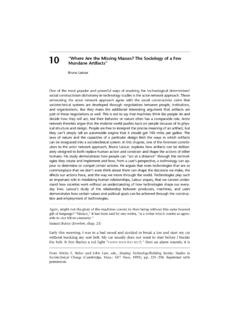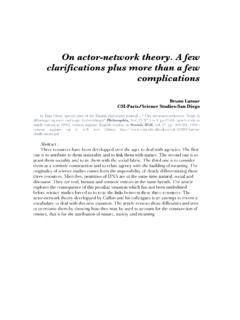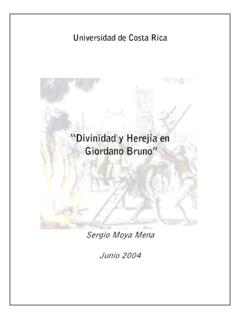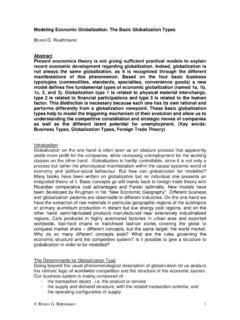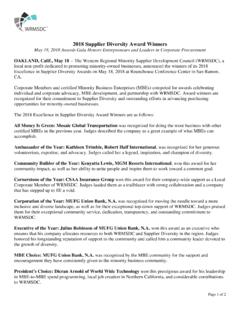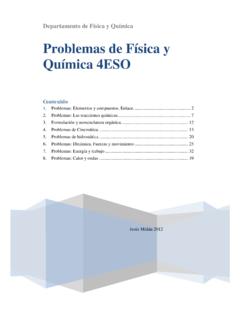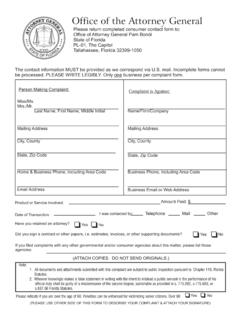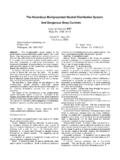Transcription of Waiting for Gaia. Composing the common ... - bruno-latour.fr
1 Waiting for Gaia. Composing the common world through arts and politics*. A lecture at the French Institute, London, November 2011. for the launching of SPEAP. (the Sciences Po program in arts & politics). bruno Latour, Science Po. Abstract: There is no single institution able to cover, oversee, dominate, manage, handle, or simply trace ecological issues of large shape and scope. Many issues are too intractable and too enmeshed in contradictory interests. We have problems, but we don't have the publics that go with them.
2 How could we imagine agreements amid so many entangled interests? We will review several attempts to tackle ecological problems by connecting the tools of scientific representation with those of arts and politics and present the program of Experimentation on Arts and Politics which has been running at Sciences Po since September 2010. What are we supposed to do when faced with an ecological crisis that does not resemble any of the crises of war and economies, the scale of which is formidable, to be sure, but to which we are in a way habituated since it is of human, all too human, origin?
3 What to do when told, day after day, and in increasingly strident ways, that our present civilization is doomed; that the Earth itself has been so tampered with that there is no way it will ever come back to any of the various steady states of the past? What do you do when reading, for instance, a book such as Clive Hamilton titled Requiem for a species: Why We Resist the Truth about Climate Change and that the species is not the dodo or the whale but us, that is, you and me? Or Harald Welzer's Climate Wars: What People Will Be Killed For in the 21st Century, a book that is nicely divided in three parts: how to kill yesterday, how to kill today, and how to kill tomorrow!
4 In every chapter, to tally the dead, you have to add several orders of magnitude to your calculator! The time of great narratives has past, I know, and it could seem ridiculous to tackle a question so big from so small a point of entry. But that's just the reason * I thank Michael Flower for many suggestions and for kindly correcting my English. 124-Londres-On Gaia 2. I wish to do so: what do we do when questions are too big for everybody, and especially when they are much too grand for the writer, that is, for myself?
5 One of the reasons why we feel so powerless when asked to be concerned by ecological crisis, the reason why I, to begin with, feel so powerless, is because of the total disconnect between the range, nature, and scale of the phenomena and the set of emotions, habits of thoughts, and feelings that would be necessary to handle those crises not even to act in response to them, but simply to give them more than a passing ear. So this essay will largely be about this disconnect and what to do about it. Is there a way to bridge the distance between the scale of the phenomena we hear about and the tiny Umwelt inside which we witness, as if we were a fish inside its bowl, an ocean of catastrophes that are supposed to unfold?
6 How are we to behave sensibly when there is no ground control station anywhere to which we could send the help message, Houston, we have a problem ? What is so strange about this abysmal distance between our little selfish human worries and the great questions of ecology is that it's exactly what has been so valorised for so long in so many poems, sermons and edifying lectures about the wonders of nature. If those displays were so wonderful, it was just because of this disconnect: to feel powerless, overwhelmed, and totally dominated by the spectacle of nature is a large part of what we have come to appreciate, since at least the 19th century, as the sublime.
7 Remember Shelley: In the wild woods, among the mountains lone, Where waterfalls around it leap forever, Where woods and winds contend, and a vast river Over its rocks ceaselessly bursts and raves.. How we loved to feel small when encompassed by the magnificent forces of the Niagara Falls or the stunning immensity of the Arctic glaciers or the desolate and desiccated landscape of the Sahara. What a delicious thrill to set our size alongside that of galaxies! Small compared to Nature but, as far as morality is concerned, so much bigger than even Her grandest display of power!
8 So many poems, so many meditations about the lack of commensurability between the everlasting forces of nature and the puny little humans claiming to know or to dominate Her. So one could say, after all, that the disconnect has always been there and that it is the inner spring of the feeling for the sublime. The everlasting universe of things Flows through the mind, and rolls its rapid waves, Now dark--now glittering--now, reflecting gloom-- Now lending splendor, where from secret springs The source of human thought its tribute brings.
9 But what has become of the sublime lately, now that we are invited to consider another disconnect, this time between, on one side, our gigantic actions as humans, I mean as collected humans, and, on the other side, our complete lack of a grasp on what we have collectively done? 124-Londres-On Gaia 3. Let us ponder a minute what is meant by the notion of anthropocene , this amazing lexical invention proposed by geologists to put a label on our present period. We realise that the sublime has evaporated as soon as we are no longer taken as those puny humans overpowered by nature but, on the contrary, as a collective giant that, in terms of terawatts, has scaled up so much that it has become the main geological force shaping the Earth.
10 What is so ironic with this anthropocene argument is that it comes just when vanguard philosophers were speaking of our time as that of the posthuman ; and just at the time when other thinkers were proposing to call this same moment the ''end of history . It seems that history as well as nature have more than one trick in their bag, since we are now witnessing the speeding up and scaling up of history not with a posthuman but rather with what should be called a post-natural twist! If it is true that the anthropos is able to shape the Earth literally (and not only metaphorically through its symbols), what we are now witnessing is anthropomorphism on steroids.

